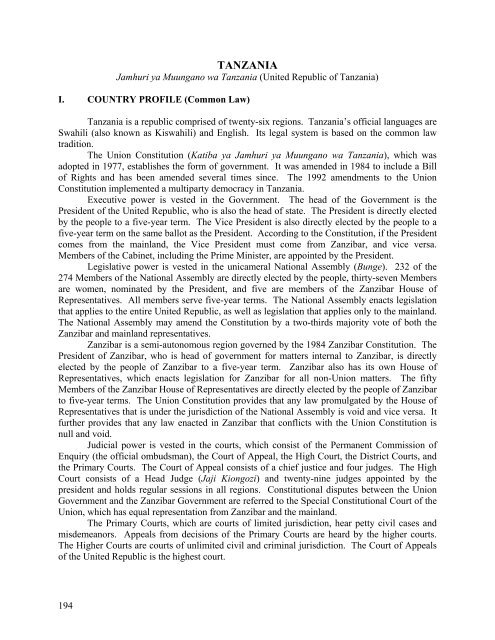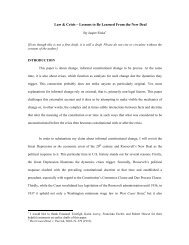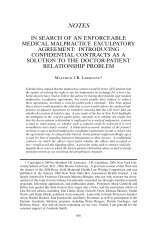Guide to Foreign and International Legal Citations - New York ...
Guide to Foreign and International Legal Citations - New York ...
Guide to Foreign and International Legal Citations - New York ...
You also want an ePaper? Increase the reach of your titles
YUMPU automatically turns print PDFs into web optimized ePapers that Google loves.
194<br />
TANZANIA<br />
Jamhuri ya Muungano wa Tanzania (United Republic of Tanzania)<br />
I. COUNTRY PROFILE (Common Law)<br />
Tanzania is a republic comprised of twenty-six regions. Tanzania’s official languages are<br />
Swahili (also known as Kiswahili) <strong>and</strong> English. Its legal system is based on the common law<br />
tradition.<br />
The Union Constitution (Katiba ya Jamhuri ya Muungano wa Tanzania), which was<br />
adopted in 1977, establishes the form of government. It was amended in 1984 <strong>to</strong> include a Bill<br />
of Rights <strong>and</strong> has been amended several times since. The 1992 amendments <strong>to</strong> the Union<br />
Constitution implemented a multiparty democracy in Tanzania.<br />
Executive power is vested in the Government. The head of the Government is the<br />
President of the United Republic, who is also the head of state. The President is directly elected<br />
by the people <strong>to</strong> a five-year term. The Vice President is also directly elected by the people <strong>to</strong> a<br />
five-year term on the same ballot as the President. According <strong>to</strong> the Constitution, if the President<br />
comes from the mainl<strong>and</strong>, the Vice President must come from Zanzibar, <strong>and</strong> vice versa.<br />
Members of the Cabinet, including the Prime Minister, are appointed by the President.<br />
Legislative power is vested in the unicameral National Assembly (Bunge). 232 of the<br />
274 Members of the National Assembly are directly elected by the people, thirty-seven Members<br />
are women, nominated by the President, <strong>and</strong> five are members of the Zanzibar House of<br />
Representatives. All members serve five-year terms. The National Assembly enacts legislation<br />
that applies <strong>to</strong> the entire United Republic, as well as legislation that applies only <strong>to</strong> the mainl<strong>and</strong>.<br />
The National Assembly may amend the Constitution by a two-thirds majority vote of both the<br />
Zanzibar <strong>and</strong> mainl<strong>and</strong> representatives.<br />
Zanzibar is a semi-au<strong>to</strong>nomous region governed by the 1984 Zanzibar Constitution. The<br />
President of Zanzibar, who is head of government for matters internal <strong>to</strong> Zanzibar, is directly<br />
elected by the people of Zanzibar <strong>to</strong> a five-year term. Zanzibar also has its own House of<br />
Representatives, which enacts legislation for Zanzibar for all non-Union matters. The fifty<br />
Members of the Zanzibar House of Representatives are directly elected by the people of Zanzibar<br />
<strong>to</strong> five-year terms. The Union Constitution provides that any law promulgated by the House of<br />
Representatives that is under the jurisdiction of the National Assembly is void <strong>and</strong> vice versa. It<br />
further provides that any law enacted in Zanzibar that conflicts with the Union Constitution is<br />
null <strong>and</strong> void.<br />
Judicial power is vested in the courts, which consist of the Permanent Commission of<br />
Enquiry (the official ombudsman), the Court of Appeal, the High Court, the District Courts, <strong>and</strong><br />
the Primary Courts. The Court of Appeal consists of a chief justice <strong>and</strong> four judges. The High<br />
Court consists of a Head Judge (Jaji Kiongozi) <strong>and</strong> twenty-nine judges appointed by the<br />
president <strong>and</strong> holds regular sessions in all regions. Constitutional disputes between the Union<br />
Government <strong>and</strong> the Zanzibar Government are referred <strong>to</strong> the Special Constitutional Court of the<br />
Union, which has equal representation from Zanzibar <strong>and</strong> the mainl<strong>and</strong>.<br />
The Primary Courts, which are courts of limited jurisdiction, hear petty civil cases <strong>and</strong><br />
misdemeanors. Appeals from decisions of the Primary Courts are heard by the higher courts.<br />
The Higher Courts are courts of unlimited civil <strong>and</strong> criminal jurisdiction. The Court of Appeals<br />
of the United Republic is the highest court.
















